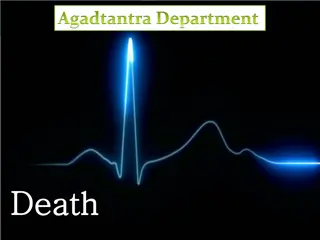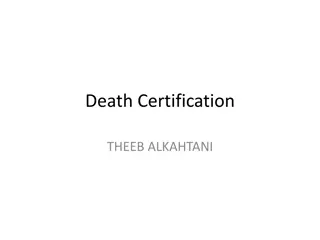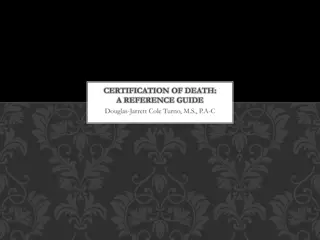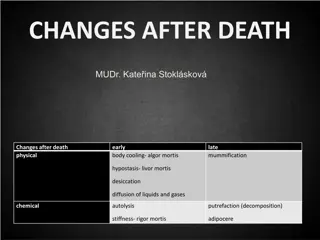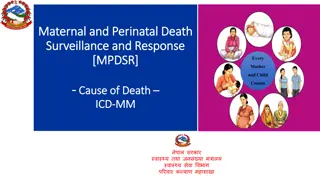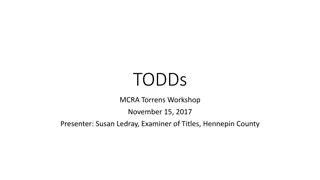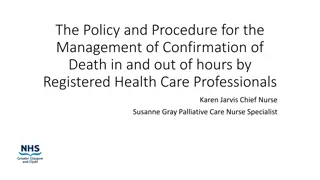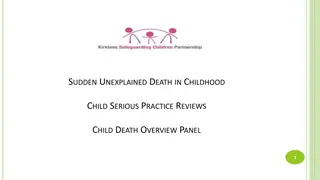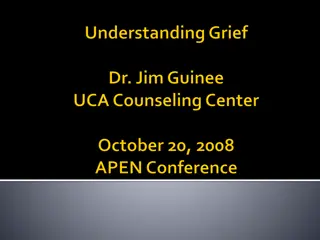
Estate Planning Essentials and Legacy Considerations
This informative presentation covers essential aspects of estate planning and legacy considerations, including directions for your estate, leaving money to family and charity, and the importance of notifying charities of your plans. It emphasizes the importance of thoughtful decision-making and seeking professional advice to ensure your wishes are carried out effectively.
Download Presentation

Please find below an Image/Link to download the presentation.
The content on the website is provided AS IS for your information and personal use only. It may not be sold, licensed, or shared on other websites without obtaining consent from the author. If you encounter any issues during the download, it is possible that the publisher has removed the file from their server.
You are allowed to download the files provided on this website for personal or commercial use, subject to the condition that they are used lawfully. All files are the property of their respective owners.
The content on the website is provided AS IS for your information and personal use only. It may not be sold, licensed, or shared on other websites without obtaining consent from the author.
E N D
Presentation Transcript
Tippie College of Business Death is in the Details Life Lessons Webinar February 8, 2023
Reminder: Life Lessons webinars are designed to provide an overview of matters you may wish to consider at different stages of life. The webinar information does not, and is not intended to, constitute legal or financial advice; instead, all webinar information, content, and materials are for general information purposes only. Please contact your personal financial advisor or attorney to obtain advice with respect to your specific circumstances.
Three Directions for your Estate 1. Family or other individuals 2. Charity 3. Government 1. Federal government only if very large estate (over $12.92 million) and are not leaving assets to spouse or charity 2. State government - possible inheritance tax depending on state 3. Laws of Intestacy only applies if die without directing where assets go and have no living relatives that can be located Tippie College of Business
Leaving Money to Family Treat family members equally, or allocate based on perceived need? Leave money outright to family members or in trust? Put everything in writing don t rely on someone s word Think twice about naming a family member as executor use a professional Tippie College of Business
Leaving Money to Charity Think about what impact you want your philanthropy to have and which charities you want to support Do you want to support a specific program, purpose, or area of research? Do you want to establish your own fund with the charity? Talk to your family and advisors Tippie College of Business
Why Notify Charity of Plans? Can make sure charity is able to use gift as donor intends Discontinued programs Gift minimums Unacceptable restrictions Can ensure that donor has used correct legal name of charity Allows charity opportunity to thank donor recognition and stewardship Gives donor opportunity to create gift agreement Tippie College of Business
Gift Agreement Can be used with will, trust, or beneficiary designation form Can enhance, but not change, a gift s wording Ensures donor s intent is clear Can be changed without changing underlying document Tippie College of Business
susan.hagan@foriowa.org Tippie College of Business
The Funeral Directors Role Transports the remains as needed Helps facilitate the person s final wishes Assisting the family/designee through the process Provides service assistance Churches, funeral home, event venues, etc. Assistance with obituaries Death certificates (originates with a Funeral Director) Social Security notification Veteran Administration notification Tippie College of Business
Burial or Cremation or Donation? Burial Traditional burial Immediate burial No embalming Per religious doctrine Green burial Cremation Cremated remains can be buried, given to family, scattered per wishes, etc. Body Donation Organ and/or tissue donation For research Tippie College of Business
Pre-planning Selecting the funeral home Documenting final wishes Recommend family members be present when discussing Pre-payment if desired Ensures that at a time of sadness, it eases the burden of these decisions Tippie College of Business
Death Away From Home If cremation is preferred, a funeral home in that locale may provide the service, as can your preferred funeral home. If the remains are to be brought home, it is best to work with your preferred funeral home. They will engage the services of another party to assist. Any death out of the United States is more complex; handled by the Department of State with the assistance of the preferred funeral home. Your preferred funeral home is your best source of information and assistance. Tippie College of Business
Prepare Information for your Survivors Simplifies things for family, clients, co-workers Compile information and let survivors know location of this information (original will, account information, etc.) Prepare listing of accounts, investments, life insurance, attorney, etc. Prepare formal document regarding your final remains Provide sufficient information on beneficiaries and heirs Provide permission to access digital assets Some websites have online tool Provide log in and password information
Ways to Transfer Assets at Death Direct Transfer Joint Living Trust Estate Administration Ownership Assets Controlled IRAs/401k, POD/TOD, life insurance Assets jointly titled Assets titled to the trust Everything else not designated Distribution Process Automatic Automatic Governed by trust Court supervised
Living (or Revocable) Trust Created while owner is alive through formal documentation Assets transferred into the trust Trust operates for benefit of beneficiary Allows control of distributions to beneficiaries Assets in trust may avoid probate costs May provide faster distribution of assets Does not eliminate the need for a will
Wills Name a legal guardian for minor children Name an executor (may charge a fee) Instruct executor on how to distribute assets Those owned individually Those not held in a trust Speed up process of settling estate in courts If There is No Will If you die without a will (intestate), the courts Appoint guardian for children Appoint administrator of estate Distribute assets based on intestate succession laws (per state laws)
The Role of Executor/Administrator Obtain an attorney (determine fees) Locate original will (if there is a will) and be appointed executor/administrator Notify heirs/beneficiaries/creditors Estate Recovery Program Gather assets and determine value File an inventory with the court File state and/or federal inheritance/estate tax returns if required File decedent's final tax return if required Pay off any claims File estate income tax return Distribute assets







